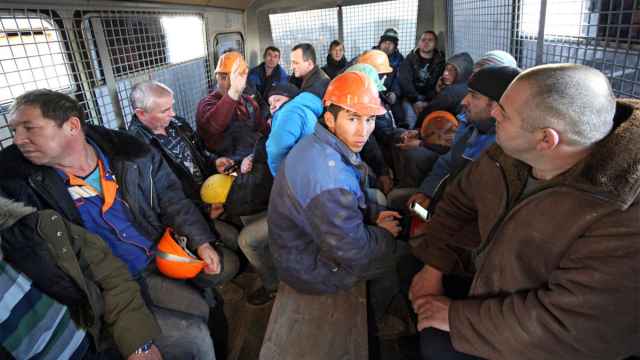Держитесь левой стороны (Keep to the left)
Moscow metro, late in the evening. The cars are blessedly half-empty, allowing a tired expat to plop down on a seat and slip into that comfortable half-stupor facilitated by fatigue, a good meal, a bit too much wine and the gentle rocking of the cars. As the doors are about to close, we are exhorted to be polite to our fellow travelers, stand away from the doors and hold on to handrails: держитесь за поручни. After a few stops I get out to switch lines. Plodding along I suddenly notice the sign above the stairs: Держитесь левой стороны (Keep to the left).
Бац! (Wham!) My pleasant stupor is abruptly disrupted. What’s with all these prepositions and cases with the verb держаться?
I hadn’t thought about this before, and after some research I came to the conclusion that I have been probably making a dozen mistakes a day with this very versatile verb.
Держать is to hold something and therefore держаться is the reflexive form, which means that for the most part it has to do with how you hold yourself. Unadorned, it describes how you behave or your manner. Он держался очень скромно, не жаловался, ничего не просил (He was very modest, didn’t complain or ask for anything.) You hear this word a lot in discussions of the military: Наши солдаты держались мужественно (Our soldiers were brave.) Or anyone in a difficult situation: Как она держится после смерти мужа? (How is she holding up after her husband died?)
You are likely to hear the imperative a lot, and unfortunately it is usually used when things are bad. Держись! (Hang in there!) Держитесь! Ремонт вот-вот и закончится! (Hang in there. The repairs are just about done.) Тяжёлая ситуация у тебе на работе. Держись! (Your work situation is awful. Hang tight!)
You might also hear it in a negative sense: держаться подальше от человека means to keep away from someone. Я не знаю, чем он занимается, но лучше держаться от него подальше (I don’t know what he’s up to, but it’s better to keep your distance from him.)
Держаться can also just mean to hold or keep something in general: Вино держится в специальном холодильнике, где всегда оптимальная температура (The wine is kept in a special refrigerator that maintains an optimal temperature.) Or it might refer to something that is holding on, literally or figuratively: Дом ещё держится несмотря на ветер, дождь и снег (The house is still standing despite the wind, rain and snow.) Старые обычаи ещё держатся в этой деревне (Old traditions are still observed in this village.) Запах от краски долго держится (Paint fumes stick around for a long time.)
Or it can even mean a pet or animal being held and raised. You can say: Мой дядя держит попугаев (My uncle raises parrots) or use the slightly dated phrase В зоопарке держатся дельфины, слоны и попугаи (Dolphins, elephants and parrots are kept in the zoo.)
And then we start adding prepositions. На (on) with держаться is logical and easy. It is used with the prepositional case to describe how something is standing, held up or onto something. Classically, you might use it to describe a drunk person: Он еле держится на ногах (He can barely stay on his feet.) Or how a painting is hanging: Картина — очень тяжёлая. Она держится на большом гвозде (The painting is really heavy. It’s hanging on a big nail.)
When you want to hold onto to someone or something, you use за and the accusative case (кого/что). This is what you hear in the cheery metro announcement: Держитесь за поручни (Hold on to the handrails!) Здесь скользко! Держитесь за меня, чтобы вы не упали. (It’s slippery here! Hold onto to me so you don’t fall.) You can also use this figuratively: Надо мне держаться за работу, пока сын учится (I’ve got to hold on to my job while my son is still in school.)
If you want to follow someone or something — “hold a course following something/someone” — then you use за with the instrumental case (кем/чем). Мы не знали дорогу, так что мы держались за машиной моих родителей (We didn’t know the way so we followed my parents in their car.)
Finally, there is держаться and the genitive case, which is used only with things (чего). This is the one that doesn’t fit into my logical framework. It is used to express keeping to a particular direction— what you see in metro corridors. Держитесь левой стороны (Keep to the left!) Sometimes I think this particular command is optional, since half of Moscow’s metro riders ignore it. But if you were in a boat, say, and someone said Держитесь левого берега (Keep to the left bank), you ought to obey, since the right bank might be rocky or mined or filled with pirates. You just never know.
This construction can also be used more figuratively to mean having a particular opinion, point of view, or sticking to a set of laws or rules. Все мои родственники держатся либеральных взглядов (All my relatives have liberal views.) Я пыталась его уговорить, но он держится прежнего мнения (I tried to convince him, but he is sticking to his previous opinion.) Автор держится исторической правды (The author doesn’t stray from historical truth.)
If you get all of this right, someone might use another related expression. This is what you say when someone has done a good job: Так держать! (Keep up the good work!)






